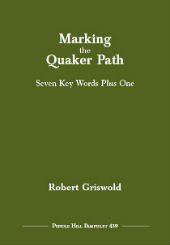Marking the Quaker Path: Seven Key Words Plus One
Reviewed by Marty Grundy
November 1, 2016
 By Robert Griswold. Pendle Hill Pamphlets (number 439), 2016. 34 pages. $7/pamphlet.
By Robert Griswold. Pendle Hill Pamphlets (number 439), 2016. 34 pages. $7/pamphlet.
Buy from QuakerBooks
Robert Griswold offers this brief pamphlet in an attempt to show Friends, both longtime and new, that being a Quaker means being on a lifelong path of ongoing spiritual growth. His seven key words are intended to point to what is integral to both Friends’ spiritual life and witness. He calls them “growth markers” rather than intellectual concepts. Many of them are difficult, even anathema, for refugees who come to our meetings because they dislike requirements of any kind.
The first key word, condition, requires a conscious awareness of ourselves as being in a condition requiring change. We can’t be fed if we insist we are not hungry. We need to listen with humility to our inner situation, our condition, and acknowledge it.
Experience is the critical foundation for Friends, upon which we base our understanding of who we are in relation to everything else and what we are called to do. It is beyond verbal description. For those of us who think that we have never had an experience of something within and beyond our small self, Griswold counsels being open and waiting. It might be added that we probably have had small intimations of the Divine, but, expecting something else, we have dismissed them. We need to help one another identify and claim these ineffable but critically important experiences.
We enter into a covenant. This is not a negotiated contract but a relationship with the Divine that is “unconditional and permanent, or it is nothing.” It guides our life.
In order to stay on the Quaker path, discipline is required. It is a “muscle that acquires strength through exercise.” Both individual and group discipline is required because “without shared work there is no community.” Griswold lifts up the importance of committee work for all.
Because we have infinite ways to fool ourselves into thinking that what we want is actually God’s will, discernment is required for individuals and the group. Griswold points to two misperceptions rife among Friends today: that all individuals have an equal measure of the Truth, and that every viewpoint is equally valid. In fact not everyone is equally disciplined in commitment to the spiritual life, to turning away from the ego to wait in silence for Divine Reality to be heard. Not all are equally willing to be humbly vulnerable to one another and open to correction and change.
In short, not all speak with equal authority. Griswold notes that authority must be exercised with responsibility. It is the authority to love. He regrets that we have lost the communal knowledge of eldering as “loving authoritatively,” because this is necessary for a well-functioning meeting.
If we follow the path marked by these words, we will find ourselves in the beloved community. This is “the fruit of lives lived in covenant with the reality of divine Love.”
Finally, Griswold adds his own final summary word: submission. As he notes, “Progress in the life of the Spirit requires everything from us.” We must submit to the requirements of each of these marker words.
Griswold’s writing is straightforward and declarative. He doesn’t soften his language. For Friends who bristle at being told what must be done, perhaps the more invitational tone of Marcelle Martin’s Our Life Is Love will be more accessible. The message of these two is essentially the same. They are both speaking Truth, and both carry the sense that Friends have something vitally important to offer the hurting world at this critical time—but only if we understand what it is and surrender our lives to be transformed and used by this Truth.



Comments on Friendsjournal.org may be used in the Forum of the print magazine and may be edited for length and clarity.